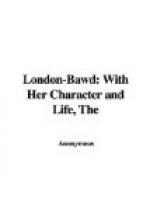Thus they continu’d Revelling and Spending, whilst his poor Wife went with a hungry Belly, and her small Children almost wanted Bread; which with the grief she took to see her Husband unreclaimable cast her into a fit of Sickness; which in a few days brought her to her Grave, to the great Grief of her poor Children and her Neighbours, who all Lamented her: But to the great Joy of her Scotish Husband and the Graceless Quean that he maintain’d, who now thought all their own, and that they might Sin on without Controul. But tho his Vertuous Wife wanted an Elegy, she shall not want an Epitaph:
HER EPITAPH.
Here lies the poor Remains of a good Wife, Who through an unkind Husband lost her life: Tho’ she was vertuous, yet he kept her poor; And spent his Substance on a filthy Whore. Whilst she in vain of him implor’d Relief, She sunk beneath a weighty Load of Grief: Which Death perceiving, prov’d her kindest Friend, And lent his Aid to bring her to her End: Which if her Husband does not now lament, He shall (when ’tis too late) at last Repent. And tho’ he revels now without controul, Yet she shall Sing, when ’tis his turn to howl.
This Good-Woman’s Death, was very welcome to her unkind Husband, who had now no Body to controul him in his wicked Courses; but the Bawd the Whore and himself had a merry Meeting the next day after she was buried; and being well flushed with Wine, the Jilt thus began to Triumph:
Whore. Well now, my Dear, we shall be all at ease; and I am rid of them that hated me: For my Part I am resolv’d to mourn in Sack; for now I need not fear her Spies that us’d to be still harkening at the Door; that I cou’d hardly let a Fart, but it was carryed to her straight by one or other. Now she can hear us talk no more unless her Ghost walks, and I’ll venture that; Come, Drink to me, my Dear, I’ll pledge it, tho ’twere o’er her Grave: My Chuck! Thou’rt the best Friend I have: For all her spite, I always found thee constant: And what I had was still at thy command, and Day nor Night I ne’er refus’d thee all the Pleasures I could give thee. And I am sure study’d to delight thee all I cou’d, and so did never thy black Joan, thou knowst.
Now thou art mine, come take a Thousand
Kisses,
There’s none that now can keep
us from our Blisses,
Prodigal. My Love, thou know’st I have been always true to thee, and so will ever be; and I’ll say that for thee, thou never deny’dst me yet to kiss and feel, when I’d a Mind to’t. And I am glad to find thee art so witty: But thou art nothing but Charms; methinks I see the Lilly and the Rose (as heretofore they did ’twixt York and Lancaster) are once again contending in thy Cheeks; and thy Eyes sparkle like two Diamonds; Come, let me now embrace thee in my Arms; nay never fear, here’s none that will disturb us—for she that us’d to make us both so cautious is now laid low enough, & will disturb us here no more, I hope.




